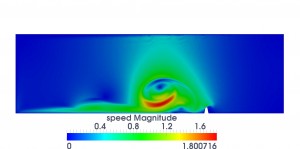COFFEE develops many codes for the simulation of complex flows (particulate flows, plasma physics, porous media, biofilms formation…)
Most of them does not exist as a public version: they are either prototypes
for internal purposes, or reserved to industrial partners.
Do not hesitate to contact us if you are interested in a specific development, comparisons, or collaborations.
Code ComPASS
The acronym means “Computing Parallel Architecture to Speed Up Simulations” and the development of the code is part of our research effort devoted to the simulations of flows in porous media. We have in mind specific applications like geothermal systems, gas and oil recovery, CO2 storage, nuclear waste depository, etc. Available commercial tools are restricted, either in terms of the models that can be addressed, or in terms of the numerical methods to evaluate the solutions (roughly speaking structured meshes cannot account for complex geology and geometries including faults or discrete fracture networks or complex wells; parallel efficiency is also limited).
We have started the development of a new code adapted to general polyhedral meshes, a large family of finite volume schemes with various degrees of freedom, and to distributed parallel architectures. The current version of ComPASS has been tested on a gas storage two phase flow benchmark with GDFSuez using the Vertex
Approximate Gradient spatial discretization. The results have shown a very good parallel scalability with a few millions of cells and on up to 1024 cores.
ComPASS team: Cindy Guichard (univ. Paris 6), Roland Masson (UNS), Konstantin Brenner (UNS), Robert Eymard (Univ. Marne-la-Vallee).
Code NS2DDV
The code NS2DDV is developed jointly with the team SIMPAF based at INRIA Research Centre, Lille Nord, France.
It is devoted to the simulation of non-homogeneous viscous flows, in two-dimensional geometries.
The code is based on an original hybrid Finite Volume/Finite Element scheme; it works on unstructured meshes and can include mesh refinements strategies.
Further details can be found in the research papers: J. Comput. Phys., 227, 4671-4696, 2008 and J. Comput. Phys., 229 (17), 6027-6046, 2010.
The code exists in two versions: a Matlab public version, a C++prototype version allowing more ambitious simulations. Both versions are still subject to developments. The current versions is restricted to incompressible flows but on-going progress is concerned with the simulation of avalanches. The source code of the public version is downloadable and several benchmarks tests can be reproduced directly.
Do no hesitate to contact us if you are interested in specific simulations or further developments of the method.
Simbiof
We are developing numerical methods, currently by using Finite. Differences approaches, for the simulation of biofilms growth.
The underlying system of PDEs takes the form of multiphase flows equations with conservation constraints.
The numerical experiments have permitted to bring out the influence of physical parameters on the multidimensional growth dynamics.
AP_PartFlow
We are developing experimental codes, mainly based on Finite Differences, for the simulation of particulate flows.
A particular attention is paid to guaranty the asymptotic properties of the scheme, with respect to relaxation parameters.



